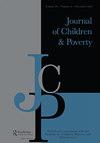Risk-taking behaviors of homeless youth: moderation by parental monitoring and social support
Q2 Social Sciences
引用次数: 2
Abstract
ABSTRACT Adolescence is a critical developmental period when youth are transitioning to be more independent while also being at heightened risk for negative developmental trajectories. This is especially true for adolescent youth experiencing homelessness. Using state population-representative 2017 Youth Risk Behavior Survey (YRBS) data, we examined the association between youth homelessness and engagement in risk-taking behaviors. The moderating roles of parental monitoring and social support were also examined. We found that 2.8% (8,922) of students were experiencing homelessness, and youth homelessness was associated with engagement in a greater number of risk-taking behavior types. The association between youth homelessness and risk-taking behaviors was not moderated by parental monitoring, which was high for stably housed youth as well as homeless youth. Social support was a significant moderator. For stably housed youth, the presence of someone to talk to when youth were feeling sad was associated with engagement in fewer risk-taking behaviors. Conversely, for homeless youth, having someone to talk to when the youth were feeling sad was associated with higher engagement in risk-taking behaviors. Findings extend our understanding of risk-taking behaviors among homeless youth, a particularly vulnerable group of adolescents. The study has implications for prevention and intervention efforts to support homeless youth.流浪青年的冒险行为:父母监督和社会支持的调节
摘要青春期是一个关键的发展时期,年轻人正在向更独立的方向过渡,同时也面临着更高的负面发展轨迹风险。对于无家可归的青少年来说尤其如此。利用具有州人口代表性的2017年青年风险行为调查(YRBS)数据,我们研究了青年无家可归与参与冒险行为之间的关系。还研究了父母监督和社会支持的调节作用。我们发现,2.8%(8922)的学生无家可归,青年无家可归与更多的冒险行为类型有关。青年无家可归与冒险行为之间的联系没有受到父母监督的调节,这对稳定居住的青年和无家可归的青年来说都很高。社会支持是一个重要的调节因素。对于居住稳定的年轻人来说,当年轻人感到悲伤时,有人可以倾诉与较少的冒险行为有关。相反,对于无家可归的年轻人来说,当年轻人感到悲伤时,有人可以倾诉与更高的冒险行为有关。研究结果扩展了我们对流浪青年冒险行为的理解,流浪青年是一个特别脆弱的青少年群体。这项研究对支持无家可归青年的预防和干预工作具有启示意义。
本文章由计算机程序翻译,如有差异,请以英文原文为准。
求助全文
约1分钟内获得全文
求助全文

 求助内容:
求助内容: 应助结果提醒方式:
应助结果提醒方式:


